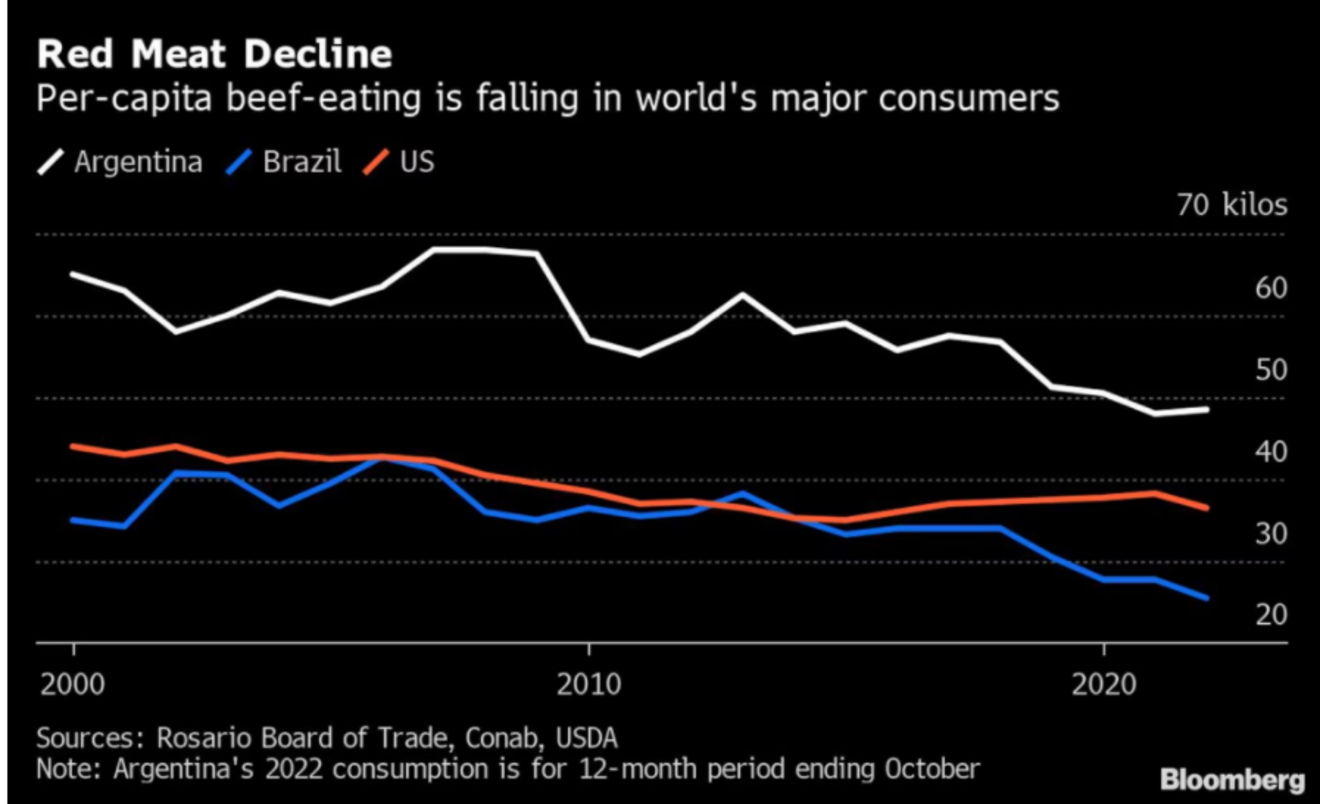Consumers around the world have cut back on meat consumption since the early days of the pandemic. In 2022, demand for beef has been hit, and even as inflation drops, all signs point to continued pressure this year, especially in some of the world's most meat-eating nations.
It is not uncommon to see meat purchases drop during economic downturns. What is striking is that demand is falling faster in many of the countries where beef has traditionally been the protein of choice. In Brazil, consumption was on track to hit a record slump in 2022. US shoppers reduced purchases by more than 4% last year, NielsenIQ data shows, while sales of roast beef and steaks in the UK fell.
Perhaps nowhere better captures the trend than Argentina. Argentine barbecue, or asado, is so closely linked to the national fabric that, even in some of the worst recessions, consumption has proved resistant to belt tightening. Recent price increases in the country, famous for consuming more beef than anywhere else, are forcing consumers to cut back on chicken, which is now vying for the title of the country's top protein.
Omar Anibal Sosa, 41, a father of three who lives in Buenos Aires, is melancholic when he remembers his last barbecue – more than a month ago, which in Argentina seems like an eternity. He remembers the menu – he reluctantly replaced the once irreplaceable ribs and flanks with low-quality flank steak cuts, along with chicken and pork. And he bought the meat by asking the butcher to cut him a lean steak or two rather than, as is traditional, ordering by the pound.
“I used to fire up the grill every weekend,” said Sosa, who works as a church handyman and delivery driver. “Today, barbecuing is a luxury,” he said.
Per capita meat consumption fell in Brazil, the United States and Argentina
For 2023, the US Department of Agriculture predicts virtually stable consumption worldwide. In some of the biggest beef markets, however, there is a pronounced drop. In Argentina, the agency sees a drop of more than 2%. A drop of almost 5% is expected for the US.
It can be tricky to accurately capture the drop in demand, because most analysts take meat production as the basis for their consumption estimates. Some of the best measures of decreasing interest in beef come from a combination of tracking retail sales and survey information.
Weak demand signals headwinds for the world's top beef producers, including JBS and Tyson Foods.
Pressure on beef demand is good news for the planet. By some measures, agriculture is responsible for more global greenhouse gas emissions than transport, thanks in large part to livestock production.
At Made in Hackney, a community vegan cooking school in east London, founder Sarah Bentley says she has noticed an evolution in people's attitudes since the school's creation a decade ago. Lentils, once considered old-fashioned and “a bit hippy”, are now a huge hit with their customers. Cooking classes book quickly. Most of the students are not vegan or vegetarian but are curious about affordable food, she said.
“You can't argue with the price,” Bentley said.
price increase
In the UK, grocery and restaurant purchases of beef were down 5.8% year-on-year, with roast sales down 22%, according to data compiled by agricultural consultant AHDB. Steak purchases are down about 19%.
Many of the consumption changes will appear subtle. People will trade cuts and proteins – beef first, then pork and chicken. Dishes such as Spaghetti Bolognese will have less meat in the sauce and will instead be beefed up with extra tomatoes or water.
“Meat is something that gets hit very quickly, especially for low-income consumers,” said Rupert Claxton, a Gira consultant who has studied the meat industry for nearly two decades.

